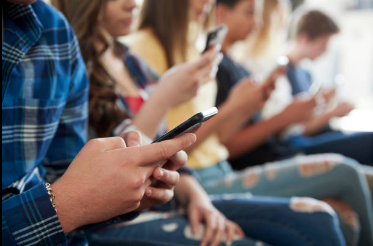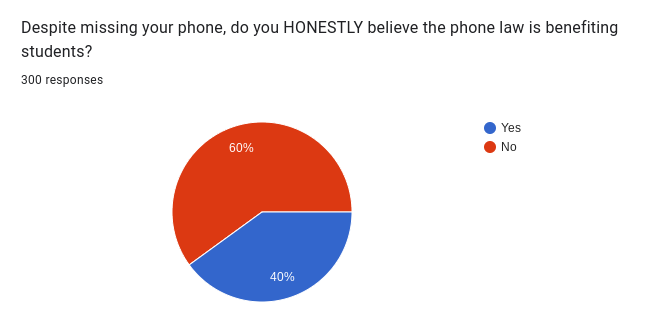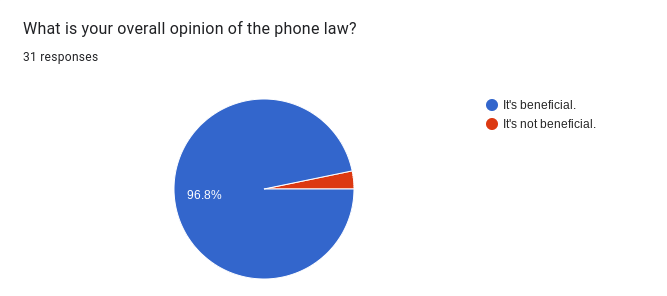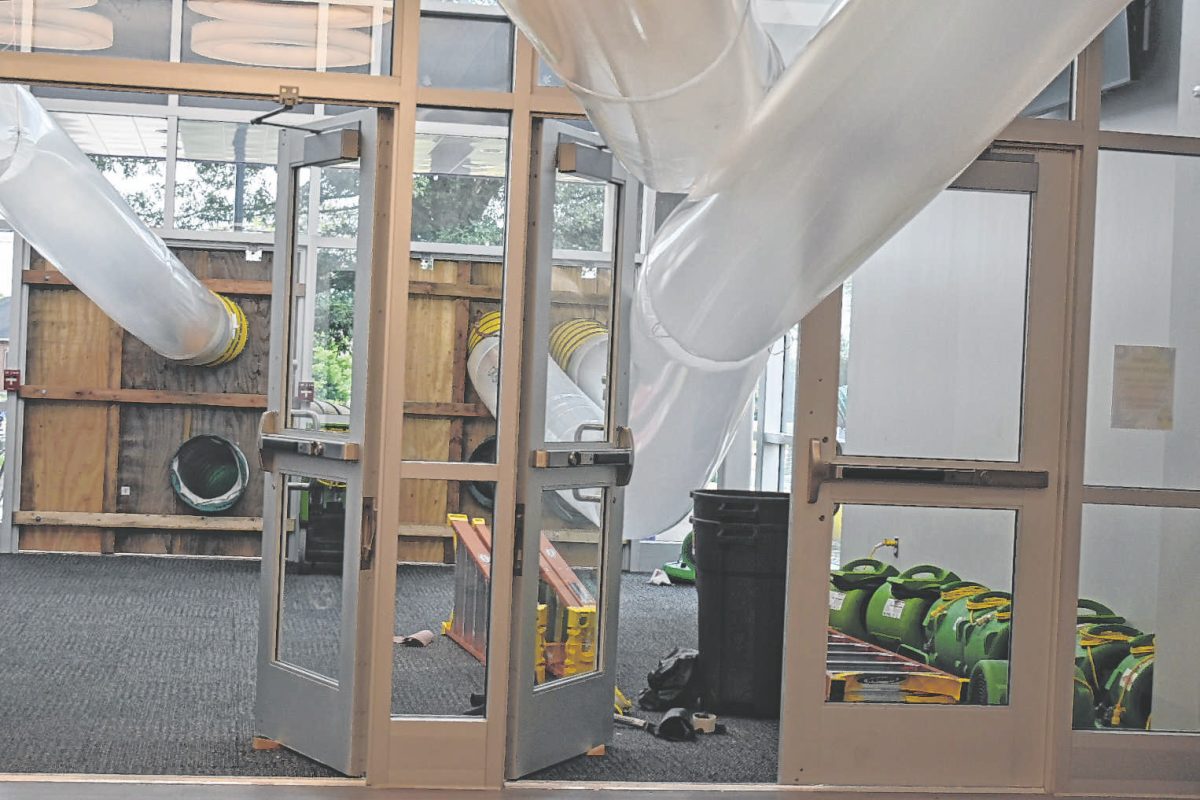Indiana’s phone law prohibits students from using their phone or any other wireless communication device during instructional time. The law only allows phones at lunch and passing periods. However, there are few exceptions to this such as a student having an emergency or needing it strictly for educational purposes. I can’t speak for other schools, but in Seymour High School teachers must get permission from the principal before students are allowed to get on their phone.
I have collected statistics on both students and teachers through a survey. Here, I’ll share the results for students:
Overall, students don’t see the law as beneficial and they believe it could be dangerous. Some students decide to share their thoughts on the matter:
A student explains how it can be harmful in the long run.
“I believe it would be more productive for students’ futures if they are taught the appropriate time times and places for phone use, instead of it being banned completely… Allowing cell phones during study hall/srt would help to foster this understanding of personal discipline and understanding.” -Eden Todd, Senior at SHS.
Another student is worried about the dangers and describes the effect it may have on others with mental disorders.
“…Not only does it impact the safety of a student in an emergency situation, it impacts the mental health of a student…. [I]t is a very terrifying situation for kids with mental disorders like OCD, such as myself. Being forced to put their phone in a bag that could be covered in germs is stressful for these kinds of students. ” -Anonymous student at SHS. A solution to this problem could be allowing students to keep phones in their Chromebook case.
Many students aren’t aware that if they talk to their teacher before class exceptions can be made for them in the case of a family emergency. The school needs to ensure students know this.
The students recalls the fear of getting in trouble when checking their phone to see how their father was. They explain, “When my dad got a surgery, I didn’t know if I would make it to say goodbye just in case and because I wanted to see him before surgery.” – Anonymous Student at SHS.
One more student lists the negative effect it has on efficiency.
They describe that using music to help them focus and being able to use their phone for a second screen to do assignments was beneficial for them. They continue to say that “if a student cannot get off their phone and pay attention to the class themselves and not needing a pouch to zip it up in, then failing that class is entirely their own fault. They can leave it in their locker if it is that big of a deal.” -Anonymous student at SHS.
Many students have said the law just causes students to be more sneaky.
They have noticed that in classes that allow students to check their phone at the end less people sneak their phone in the middle of class. Some even admit phones are an addiction that needs to be treated accordingly instead of abruptly cutting off use completely.
A common factor in responses is not being able to focus as well without music. A few suggest that during independent work time we should allow students to listen to music as a cooperation. That way, after a teacher is done with instruction time, students can focus on their work better instead of zoning out. But, this raises concerns with teenagers attention span. Have phones fried students attention span? Is this law helping to revert these effects?
Teachers have a completely different view on the law. Here are the results collected from teachers:
Overall, teachers see the law as beneficial and not dangerous. Here are some comments from teachers:
One teacher argues their point by sharing the effects of addiction.
” I am a big believer in compromises and weening off of an addiction, and, yes, phones are an addiction. It is common knowledge that going off of the substance or “thing” a person is addicted to cold turkey can cause withdraws. Withdraw symptoms include irritability, mood swings, anxiety, etc. My suggestion is to allow phones during SRT, unless the SRT teacher finds that a student is WAY behind in classes.” She goes on to consider positive and negative reinforcement. “All this being said, I do not believe phones should be allowed during Study Hall UNLESS a student can prove responsibility with passing grades and no “i”s in Harmony. Studies have been done to show the effectiveness of positive reinforcement versus negative reinforcement. In most studies, positive reinforcement has been proven to be more effective, but that does not say that negative reinforcement is ineffective.” – Ms. McKinney, 9th and 10th grade teacher at SHS.
Another teacher, “thrilled with the new phone law,” has some input as to what can be done differently.
“I can see the value of listening to music while working in a study hall or for those with no missing work, having the privilege of destressing during a study hall.” -Anonymous teacher at SHS.
There are reports of socialization improving.
“I have found that it has been easier to build relationships with students. They are not wanting to end conversations, to be able to get on their phones.” – Anonymous teacher at SHS.
“The new law has helped students socialize with each other in person more. Students are actually talking to each other!” – Anonymous teacher at SHS.
“Students in my opinion seem to have become more social with each other and willing to interact face to face both in class and in the halls. It is this positive face to face interaction that I find the most beneficial.” – Mr. Zakrzewski, an 11th and 12th grade teacher at SHS.
Some teachers believe there should be no exceptions for SRT or study hall.
“We’re here to go to school, and little to no learning is happening when students are using their phones. Putting an end to student use of phones during school is very beneficial for students, even if they don’t like it. Relaxing that policy for SRT and study hall is a terrible idea because that’s when students are epected to do their schoolwork.” – Anonymous Teacher at SHS.
Contrary to students fears, having a phone during an emergency could prove to be dangerous.
“In an emergency like a lockdown, phone use at the wrong time could be catastrophic.” -Anonymous teacher at SHS.
“Students having their phones during an emergency makes it more difficult for streamlined communication with emergency personnel. Students also put the school at risk by showing their location and providing access to outsiders.” – Anonymous teacher at SHS.
“While I appreciate that parents want to be able to contact students in an emergency, it doesn’t really make students safer from an intruder to have a phone in hand.” – Anonymous teacher at SHS.
The phone law has good and bad elements
The statistics show most teachers believe there should be no exceptions to the law when it comes to SRT and study hall. However, many written responses have well thought out ideas. Teachers have discussed that allowing phones after a student is done with their work could have benefits as well as its downsides. It can allow time for students to answer their parents and have a brain break. On the other hand, teachers would have to go back to policing phones and students who are behind on their work. It could cause arguments if one person is allowed to use their phone while another cannot.
Another suggested exception is yet again, music. According to responses, students really want music and some teachers don’t seem to think its a bad idea. Music during study hall or work time can encourage more students to work. Personally, I work more efficiently when I can listen to music. For one, silence can be unsettling. Second, music positively affects the brain. According to various different resources instrumental music has good impacts on studying. Here is a cite that covers this topic if you would like to learn more:
https://www.nu.edu/blog/can-music-help-you-study-and-focus/
Overall, 40% of students and 98.8% of teachers find the law as beneficial. Obviously, teachers and students don’t agree, which is expected. Despite the clear difference of opinion, both can agree that there are good and bad qualities of the law.

















